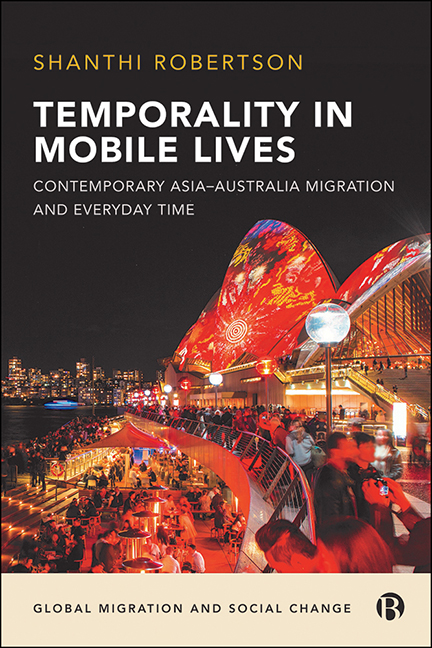Book contents
- Frontmatter
- Contents
- List of Figures
- Acknowledgements
- Series Preface
- Introduction
- 1 Chronomobilities: 21st-Century Migration and Lived Time
- 2 Asian Migrants of the Middle in Local and Global Context
- 3 Times of Work: Transified Workers and Contingent Careers
- 4 Times in Place: Moving, Dwelling, Belonging
- 5 Times of the Heart: Reconfiguring Intimacy
- Conclusion
- Notes
- References
- Index
2 - Asian Migrants of the Middle in Local and Global Context
Published online by Cambridge University Press: 04 January 2022
- Frontmatter
- Contents
- List of Figures
- Acknowledgements
- Series Preface
- Introduction
- 1 Chronomobilities: 21st-Century Migration and Lived Time
- 2 Asian Migrants of the Middle in Local and Global Context
- 3 Times of Work: Transified Workers and Contingent Careers
- 4 Times in Place: Moving, Dwelling, Belonging
- 5 Times of the Heart: Reconfiguring Intimacy
- Conclusion
- Notes
- References
- Index
Summary
Woojin and I first chatted late one evening via Skype. I was in my home office in Sydney, he was in his bedroom in a shared house in a town of about 15,000 people, about a five-hour drive from the city. Woojin was in his early twenties, with the clean-cut features of a Kpop singer, and slightly hesitant, although comfortably conversational in English. He was excited about participating in the research, seeing it as a good chance, he said, to practise his English but also to reflect on his journey in Australia. Like Hyon-Woo, Woojin is from a small town in Korea; his family lived comfortably, but his parents were not university educated. After completing his compulsory military service after high school, he trained and began work as a welder, which was a secure job. Like Hyon-Woo, Woojin's future seemed mapped out according to a standard life-path – work hard, save money, marry and start a family, and support his parents into their old age. But also like Hyon-Woo, he felt vaguely bored and dissatisfied. He thought learning English might improve his chances of more diverse career options, and he wanted to see more of the world. As for Hyon-Woo, a working holiday visa to Australia was quick and cheap to obtain, and Woojin had a few friends, also welders, who had already followed this path. He arrived in Western Australia in 2012. He initially struggled to find work, but a friend from Korea recommended him for a welding job in a regional town of New South Wales where he eventually settled. He recalled the long drive across the continent from the west coast to the east as one of his most memorable experiences in Australia – the wide-open, dramatically empty landscape, the wildlife, the endless sky. These were images of Australia he was familiar with from television and online but he had never thought, growing up, that he would ever see them with his own eyes.
As a welder, Woojin's skills were in demand in the regional town where he settled. Despite some initial problems with his English at work, he earned a good salary and the cost of living was relatively cheap, especially when compared with that of his Korean friends who were struggling to make ends meet in Sydney or Melbourne.
- Type
- Chapter
- Information
- Temporality in Mobile LivesContemporary Asia-Australia Migration and Everyday Time, pp. 49 - 76Publisher: Bristol University PressPrint publication year: 2021



